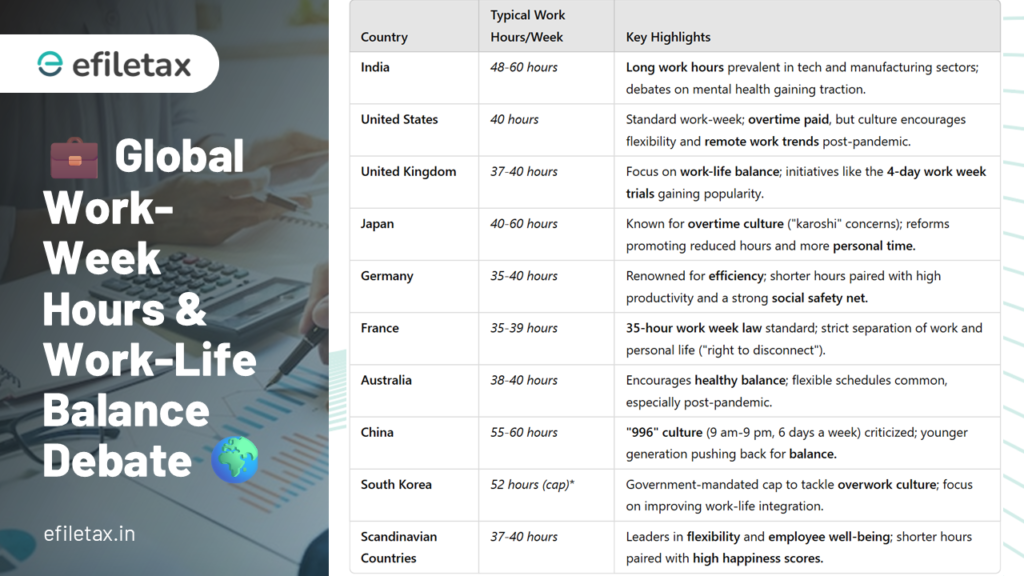
In early January 2025, the 90-hour workweek debate has reignited discussions on productivity, employee well-being, and work culture in India. Industry leaders such as Anand Mahindra, Narayana Murthy, and SN Subrahmanyan have weighed in with contrasting views, sparking national interest and varied reactions.
Narayana Murthy: The 70-Hour Workweek Proposal
This debate traces back to 2023, when Narayana Murthy, co-founder of Infosys, suggested that young Indians work 70 hours a week to elevate India’s global economic standing. Drawing comparisons to nations like Japan and Germany, Murthy highlighted the need for higher productivity. However, his comments faced criticism for potentially undermining work-life balance and mental health.
In response to backlash, Murthy later clarified that his aim was to encourage a focus on productivity rather than just increasing hours worked, stressing that the core issue is achieving meaningful outcomes.
SN Subrahmanyan’s 90-Hour Proposal
L&T Chairman SN Subrahmanyan took the conversation further, suggesting a 90-hour workweek, including Sundays. In an undated video, he questioned what employees achieve by spending extended time at home. His remarks, intended to emphasize extraordinary efforts for India’s development, drew sharp criticism for being out of sync with modern work-life balance expectations.
In response to public outrage, L&T defended Subrahmanyan’s comments, framing them as aspirational rather than prescriptive. Despite this clarification, the remarks highlighted a disconnect between traditional corporate mindsets and evolving employee priorities.
Anand Mahindra’s Call for Balance
At the Viksit Bharat Young Leaders Dialogue 2025, Mahindra Group’s Anand Mahindra presented a counterview, advocating for quality over quantity in work hours. He emphasized that productivity is not about the number of hours worked but the effectiveness and focus of those hours. “Even in 10 hours, significant outcomes can be achieved with the right mindset,” he stated, contrasting sharply with calls for extended workweeks.
Mahindra’s perspective resonated with many, positioning him as a voice for humane work practices and efficient productivity.
Public and Industry Reactions
Social media platforms, especially X (formerly Twitter), were flooded with critical reactions. Sarcasm, memes, and pointed critiques highlighted concerns about employee health, family time, and the quality of life. Rajiv Bajaj, CEO of Bajaj Auto, challenged the practicality of such proposals, urging corporate leaders to lead by example if they advocate for such work ethics.
The broader sentiment among the public and workforce leans towards rejecting excessive work hours, favoring sustainable productivity models.
Corporate Clarifications
L&T’s response emphasized Subrahmanyan’s intent to inspire extraordinary efforts for national development rather than mandate long hours for employees. Nonetheless, the controversy opened discussions on fair compensation, modern work culture, and the feasibility of such demands in a workforce increasingly prioritizing mental health and work-life balance.
Implications for India’s Work Culture
The 90-hour workweek debate encapsulates the tension between traditional work ethics and the push for humane workplace practices. While longer hours may historically symbolize dedication, modern research indicates that overwork often leads to burnout, reduced efficiency, and compromised health.
India’s path forward lies in finding a balance. Sustainable productivity models must prioritize employee well-being, ensuring that ambitious goals align with a healthy and motivated workforce.
Key Takeaways:
- Productivity Focus: Quality work often outweighs long hours in achieving impactful results.
- Modern Work Culture: Employee well-being is increasingly central to organizational success.
- Industry Voices: Contrasting views from leaders like Mahindra and Subrahmanyan highlight evolving corporate mindsets.
- Public Sentiment: The workforce rejects excessive hours in favor of balanced and efficient work practices.
- Broader Lessons: For national development, sustainable practices are critical to harnessing India’s demographic dividend.
The ongoing 90-hour workweek debate serves as a reminder of the need to evolve workplace cultures to meet the aspirations and realities of a dynamic, modern workforce. As India balances ambition with humanity, the spotlight remains on creating a productive yet compassionate work environment.
💼 Global Work-Week Hours & Work-Life Balance Debate 🌍
| Country | Typical Work Hours/Week | Key Highlights |
|---|---|---|
| India | 48-60 hours | Long work hours prevalent in tech and manufacturing sectors; debates on mental health gaining traction. |
| United States | 40 hours | Standard work-week; overtime paid, but culture encourages flexibility and remote work trends post-pandemic. |
| United Kingdom | 37-40 hours | Focus on work-life balance; initiatives like the 4-day work week trials gaining popularity. |
| Japan | 40-60 hours | Known for overtime culture (“karoshi” concerns); reforms promoting reduced hours and more personal time. |
| Germany | 35-40 hours | Renowned for efficiency; shorter hours paired with high productivity and a strong social safety net. |
| France | 35-39 hours | 35-hour work week law standard; strict separation of work and personal life (“right to disconnect”). |
| Australia | 38-40 hours | Encourages healthy balance; flexible schedules common, especially post-pandemic. |
| China | 55-60 hours | “996” culture (9 am-9 pm, 6 days a week) criticized; younger generation pushing back for balance. |
| South Korea | 52 hours (cap)* | Government-mandated cap to tackle overwork culture; focus on improving work-life integration. |
| Scandinavian Countries | 37-40 hours | Leaders in flexibility and employee well-being; shorter hours paired with high happiness scores. |
✨ What’s Driving the Change?
- Mental Health Awareness: Employees prioritize balance over pay.
- Post-Pandemic Realignment: Hybrid models gain acceptance worldwide.
- Economic Productivity: Focus on quality over quantity in working hours.
- Generational Shift: Millennials and Gen Z demand flexibility and purpose-driven roles.
🧐 Your Thoughts?
- Should India move towards a 4-day work week for better balance?
- Which country’s work culture inspires you most?
